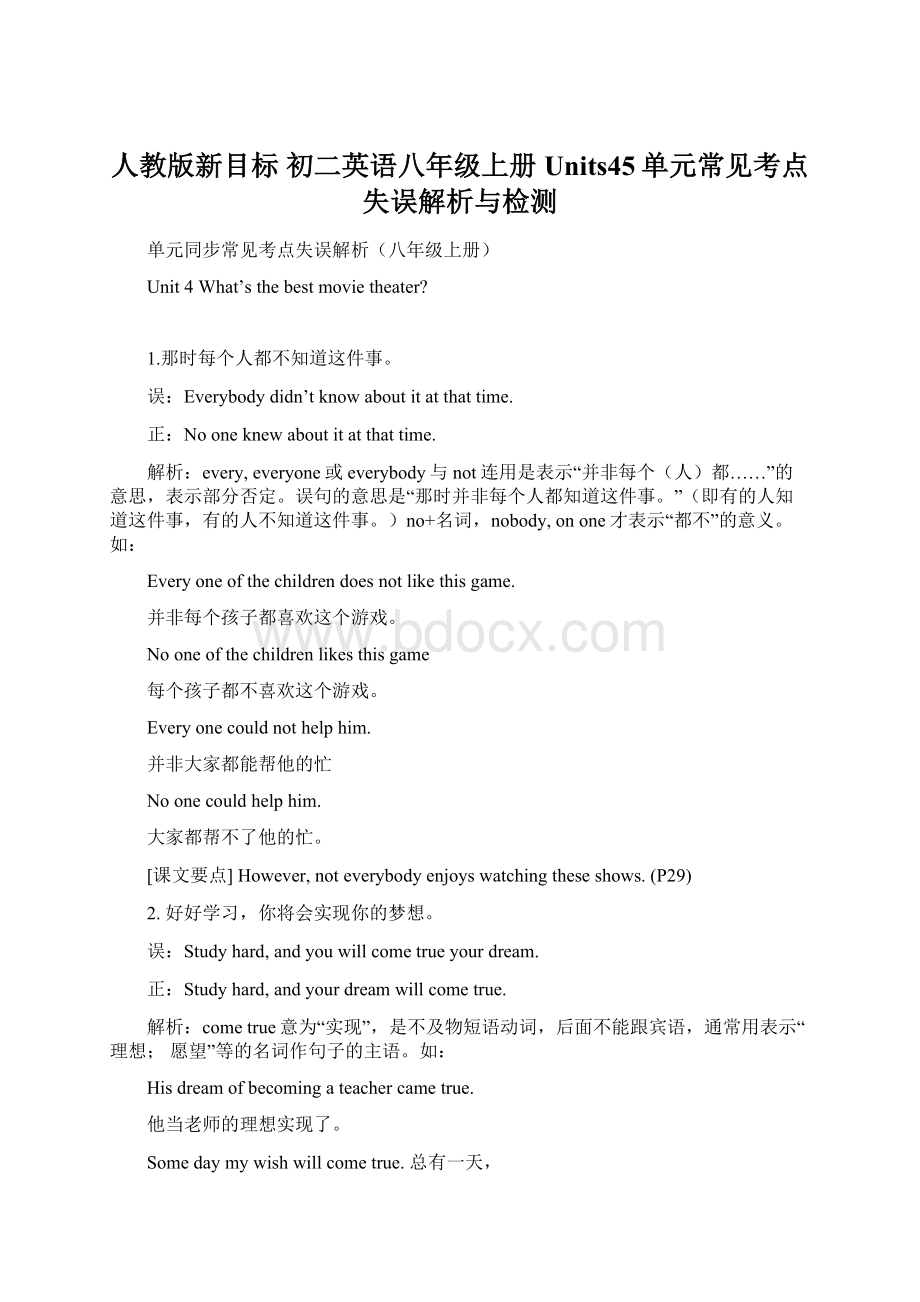人教版新目标 初二英语八年级上册Units45单元常见考点失误解析与检测.docx
《人教版新目标 初二英语八年级上册Units45单元常见考点失误解析与检测.docx》由会员分享,可在线阅读,更多相关《人教版新目标 初二英语八年级上册Units45单元常见考点失误解析与检测.docx(15页珍藏版)》请在冰豆网上搜索。

人教版新目标初二英语八年级上册Units45单元常见考点失误解析与检测
单元同步常见考点失误解析(八年级上册)
Unit4What’sthebestmovietheater?
1.那时每个人都不知道这件事。
误:
Everybodydidn’tknowaboutitatthattime.
正:
Nooneknewaboutitatthattime.
解析:
every,everyone或everybody与not连用是表示“并非每个(人)都……”的意思,表示部分否定。
误句的意思是“那时并非每个人都知道这件事。
”(即有的人知道这件事,有的人不知道这件事。
)no+名词,nobody,onone才表示“都不”的意义。
如:
Everyoneofthechildrendoesnotlikethisgame.
并非每个孩子都喜欢这个游戏。
Noone of the children likes this game
每个孩子都不喜欢这个游戏。
Everyonecouldnothelphim.
并非大家都能帮他的忙
Noonecouldhelphim.
大家都帮不了他的忙。
[课文要点]However,noteverybodyenjoyswatchingtheseshows.(P29)
2.好好学习,你将会实现你的梦想。
误:
Studyhard,andyouwillcometrueyourdream.
正:
Studyhard,andyourdreamwillcometrue.
解析:
cometrue意为“实现”,是不及物短语动词,后面不能跟宾语,通常用表示“理想;愿望”等的名词作句子的主语。
如:
Hisdreamofbecomingateachercametrue.
他当老师的理想实现了。
Somedaymywishwillcometrue.总有一天,
我的愿望将会实现。
[课文要点]Andonegreatthingaboutthemisthattheygivepeopleawaytomaketheirdreamscometrue.(P29)
3.你认为这本小说怎么样?
误:
Howdoyouthinkofthenovel?
正:
Whatdoyouthinkofthenovel?
正:
Howdoyoulikethenovel?
解析:
表示“你觉得…怎么样?
”可以说Whatdoyouthinkof…?
或How do you like…?
句型,用以询问对方对某个地方或某件事物等的看法,例如:
Whatdoyouthinkofthecity?
(= How do you like the city?
)
你觉得这座城市怎么样?
How do you like the film?
(Whatdoyouthinkofthefilm?
)
你认为这部电影怎样?
这两个句型在口语中常用How about …?
或What about…?
代替。
如:
Howabout(Whatabout)thefilm?
这部电影怎么样?
还要注意别和What do you like…?
相混,该句型主要用以询问对方的兴趣爱好,意为“你喜欢什么?
”如:
—What do you like?
你喜欢什么?
—I like swimming.
我喜欢游泳。
[课文要点]Whatdoyouthinkof970AM?
(p27)
4.我看着孩子们在操场上做早操。
误:
Iwatchedthechildrentodomorningexercises.
正:
Iwatchedthechildrendomorningexercises.
解析:
watch意为“看;注视”,用作及物动词,常用于watchsomebodydosomething复合宾语结构中,宾语补足语中的动词不定式不带to。
如:
Theywatchedthechildrenclimbupthehill.
他们看着孩子们爬上了山。
Wewatchedthestudentsplayfootballyesterdayafternoon.
昨天下午我们观看了学生踢足球。
[课文要点]It’salwaysinterestingtowatchotherpeopleshowtheirtalents.(P29)
5.我尽力想早点到这儿来,可是来不了。
误:
Itriedgettinghereearlybutcouldn’t.
正:
Itriedtogethereearlybutcouldn’t.
解析:
tryto do 表示“努力做某事”;“试图干事……”,强调付出努力,但不一定成功;如:
He didn’t try to do it.
他不肯努力去干
please try to finish this work in thirty minutes.
请尽量在30分钟完成这项工作。
try doing表示“尝试做某事”,“尝试干、干……试试”,含有“看结果如何”之意。
如:
She tried washing her hair with a new shampoo.
她试着用一种新的香波洗头发。
Why didn't you try riding a bike to go to school?
为什么不试着骑车去学校呢?
[课文要点]Theytrytolookforthebestsingers,themosttalenteddancers,themostexcitingmagicians,thefunniestactorsandsoon.(P29)
6.那家商店有各式各样的衣服。
误:
Thereareallkindofclothesinthatstore.
正:
Thereareallkindsofclothesinthatstore.
解析:
表示“各种各样”应该说kindsof。
如:
Isawallkindsofanimalsinthezoo.
我看见动物园里各种各样的动物。
Hehasallkindsofstamps.
他有各种各样的邮票。
注意:
kindof意为“相当,有一些”。
如:
I’mkindofhungry.
我有些饿了。
[课文要点]Allkindsofpeoplejointheseshows.(P29)
7.电脑在我们的生活中发挥着重要的作用。
误:
Computersplayimportantroleinourlife.
正:
Computersplayanimportantroleinourlife.
解析:
playarole意为“在……中起作用”,是固定短语,其中不定冠词不可省略, role前可加important(重要),leading(主导)等形容词。
如:
Thelocalpriestplayedaleadingroleinsettlingthedispute.
地方牧师在调解这次争端中起了主导作用。
该短语也可解作“在……中扮演角色”。
如:
Sheplayedaminorroleintheopera.
她在那出歌剧里扮演了一个小角色。
[课文要点]Whenpeoplewatchtheshow,theyusuallyplayaroleindecidingthewinner.(P29)
8.北京是世界上最古老的成都市之一。
误:
Beijingisoneofoldestcitiesintheworld.
正:
Beijingisoneoftheoldestcitiesintheworld.
解析:
形容词最高级前面须加定冠词the。
如:
ItisthemostbeautifulfilmthatIhaveeverseen.
这是我看过的电影中最好的。
Jimistheyoungestamongthetreebrothers.
吉姆是三兄弟中年纪最小的。
Thisisthehappiestdayinmylife.
这是我一生中的最愉快的一天。
[课文要点]GreenwoodParkisthebestplacetogotoonweekends.(P31)
9.我父母住在城里。
误:
Myparentsliveinthetown.
正:
Myparentsliveintown.
解析:
intown意为“在城里;在城镇”,是固定短语,town前不带冠词。
如:
Wearedoingshoppingintownnow.
现在我们正在城里买东西。
反义词outoftown“不在城里”。
如:
Smithisoutoftownthisweek.
这个星期史密斯先生不在本市。
[课文要点]I’mnewintown.(P26)
10.我们打算做游戏,你能参加吗?
误:
Wearegoingtohaveagame;canyoujoinit?
正:
Wearegoingtohaveagame;canyoujoininit?
解析:
join指加入某个党派,团体组织等,成为其成员之一,意为“参军、入团、入党”等。
如:
When did your brother join the army?
你哥哥什么时候参军的?
She joined the Young Pioneers.
她加入了少先队。
表示“和某人一道做某事”,其结构为:
join somebodyin (doing) something.,根据上下文,in (doing) something也可以省去。
如:
Will you join us in the discussion?
你参加我们的讨论吗?
He'll join us in singing the song.
他将和我们一道唱歌。
We're going to the East Lake Park on Sunday. Will you join us?
我们打算星期天去东湖公园。
你跟我们一道去好吗?
join in多指参加小规模的活动如“球赛、游戏”等,常用于日常口语。
如:
Come along, and join in the ball game.
快,来参加球赛。
Why didn't you join in the talk last night?
昨晚你为什么没参加座谈?
[课文要点]Allkindsofpeoplejointheseshows.(P29)
11.这个广播电台离公园近。
误:
Theradiostationisclosefromthepark.
正:
Theradiostationisclosetothepark.
解析:
(be)closeto意为“离……近;靠近;在……附近”,是固定短语。
如:
Ourschoolisclosetoapark.
我们学校离公园很近。
There’sabus-stopcloseto
工厂附近有一个公共汽车站。
[课文要点]It’stheclosesttohome.(P25)
12.这不是真实的情况,是她编造出来的。
误:
It'snottrue.Shemadeup.
正:
It'snottrue.Shemadeitup.
解析:
makeup意为“编造”;“组成”,用作及物短语动词,后跟名词或代词。
如果人称代词,须放在makeup中间。
如:
Ioftenmakeupstoriestomyyoungersister.
我经常编故事给我妹妹听。
[课文要点]Somethinkthatthelivesoftheperformersaremadeup.(P29)
[自我检测]
单项填空:
1.Itoldthem________likedtoseethefilm.SomeonelikedtowatchTV.
A.everybodynotB.noteverybodyC.notsomeoneD.someonenot
2.Ifwetryourbest,ourdreamwill________oneday.
A.workoutB.cometrueC.putupD.showoff
3.—________theschooltrip?
—It’sveryinteresting.
A.WhatdoyouthinkofB.whatdoyoulike
C.HowdoyouthinkofD.Howdoyouthink
4.Iamverysleepy.Itried________myeyesopen,butIcouldn't.
A.keeping B.havingkept C.tohavekept D.tokeep
5.—Doyouknowthattherearemanydifferent______animalsinthezoo?
—Yes,Ido.AndIalsoknowthatsomeofthemare______scaring.
A.kindsof;kindofB.kindsof;kindsof
C.kindof;kindsofD.kindofkindof
6.Susanwantedtobeindependentofherparents.Shetried________alone,butshedidn'tlikeitandmovedbackhome.
A.living B.tolive C.tobelivingD.havinglived
7.Whenpeoplewatchtheshow,theyusuallyplay________indecidingthewinner.
A.rolesB.theroleC.aroleD.role
8.Ofthethreepencil-boxes,theboychose________one.
A.mostexpensiveB.themostexpensive
C.thelessexpensiveD.moreexpensive
9.—What’sthebestmovietheater?
—ShowtimeCinema.It’s________inmytown.
A.cheapB.cheaperC.cheapestD.thecheapest
10.They live ________.Howabout your parents?
A.attownB.atatownC.inatownD.in town
11.—Shallwe________theafter-schoolactivities?
—Sure.Let’s________them.
A.joinin;joininB.join;joinC.join;joininD.joinin;join
Unit5Doyouwanttowatchagameshow?
1.你昨天找到了你的自行车吗?
误:
Didyoufindoutyourbikeyesterday?
正:
Didyoufindyourbikeyesterday?
解析:
find与findout用法不一样。
find意为“发现;找到”,指发现遗失物、事实、真理及事情的困难点等方面,有“偶然发现”的意味,常用“find+宾语+宾语补足语(形容词、介词短语或不定式)”。
如:
Excuseme,LiLei.Ican’tfindmypen.
请原谅,李雷。
我找不到我的钢笔了。
Heopenedtheboxandfounditempty.
他打开箱子,发现是空的。
findout多指经过一番努力的探索、观察、询问、调查、推理之后才“发现”或“找到;查出”,常指无形的或隐藏的事物。
如:
Readthestoryandfindouttheanswertothisquestion.
读下面的故事并找出这一问题的答案。
Howcanyoufindoutwhotookthebook?
你怎么能查出谁拿走了这本书?
[课文要点]BecauseIhopetofindoutwhat’sgoingonaroundtheworld.(P34)
2.我父亲是在二十世纪七十年代上的大学。
误:
Myfatherwenttocollegein1970’s
正:
Myfatherwenttocollegeinthe1970’s
解析:
表示“在……世纪……年代”要用“inthe+年份+-s/-’s”结构。
如:
Thedictionarycameoutinthe1980’s.
这本字典是在二十世纪八十年代出版的。
[课文要点]Inthe1930s,hemade87cartoonswithMickey.(P37)
3.这个消息不是真的。
误:
Thenewsarenottrue.
正:
Thenewsisnottrue.
解析:
news意为“消息”,是不可数名词,在句中做主语时,谓语动词用单数形式。
如:
Nonewsisgoodnews.
没有消息就是好消息。
注意:
news前面不可以用a(n) 或one修饰,要表示数量时,须用piece。
说“一条消息”应该说apieceofnews;“两条消息”应该说twopiecesofnews。
如:
That’sanimportantpieceofnews.
那是条重要的消息。
[课文要点]Doyouplantowatchthenewstonight?
(P34)
4.课堂上要认真听老师讲课。
误:
Listentotheteachercarefullyintheclass.
正:
Listentotheteachercarefullyinclass.
解析:
表示“在课堂上”应该说inclass,class前没有冠词。
如:
Hehadalittlerestafterlunch,butsheworkedhardinclassallday.
午饭后他休息了一会儿,但她整天都在课堂上努力学习。
注意:
intheclass意为“在班级里”。
如:
Theotherstudentsintheclasskeeptheireyesclosed.
班上的其他学生闭起眼睛。
[课文要点]A:
Whatdidyoudoinclasstoday,Sarah?
B:
WehadadiscussionaboutTVshows.(P34)
5.这是我最喜欢的音乐。
误:
Thisismymostfavoritemusic.
正:
Thisismyfavoritemusic.
解析:
favorite作形容词讲,意为“最喜欢的”。例:
What’sherfavoritesubject?
她最喜欢的学科是什么?
MyfavoriteactorisPaulJackson.
我最喜欢的演员是保罗·杰克逊。
favorite作形容词用时,本身含最高级意义,故不能与most连用。
[课文要点]ButmyfavoriteTVshowsarethenewsandtalkshows.(P34)
6.我们期待和外教们交谈。
误:
Weexpecttalkingwithforeignteachers.
正:
Weexpecttotalkwithforeignteachers.
解析:
expect意为“期待”;“预料”,用作及物动词,后跟名词、代词或带to的动词不定式,不可以跟动词-ing形式,表示“期待做某事” 。
如:
Weshouldnotexpectsuccessovernight.
我们不能期望一夜之间就取得成功。
Ididn’texpecttofindyouhere.
我没料到在这里碰到你。
Iexpectastorm.
我预计会有场暴风雨来。
[课文要点]Well,theymaynotbeveryexciting,butyoucanexpecttolearnalotfromthem.(P34)
7.男孩们看到自己的球队要赢了,都十分激动。
误:
Theboyswereexcitingwhentheysawtheirteamwaswinning.
正:
Theboyswereexcitedwhentheysawtheirteamwaswinning.
解析:
exciting意为“令人感到兴奋的”,通常主语是物/事件。
如:
AreyouexcitedaboutgoingtoBeijing?
你要去北京了,感到兴奋吗?
Iamexcitedtohearfromyouagain.
再一次收到你的信我深感激动。
Excited意为“对……感到兴奋”,通常主语是人;
Hetoldusanexcitingstoryyesterday.
他昨天给我们讲了一个使人激动的故事
ThefilmIsawyesterdaywasexciting.
昨天看的那部电影令人激动。
[课文要点]Iliketowatchactionmoviesbecause